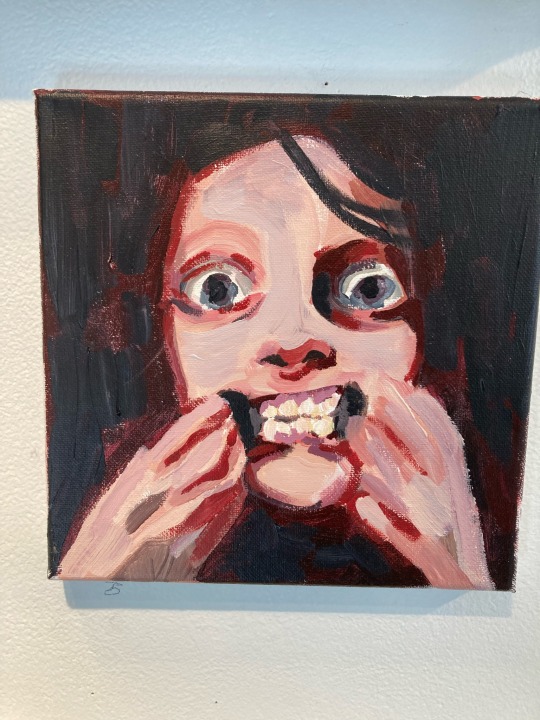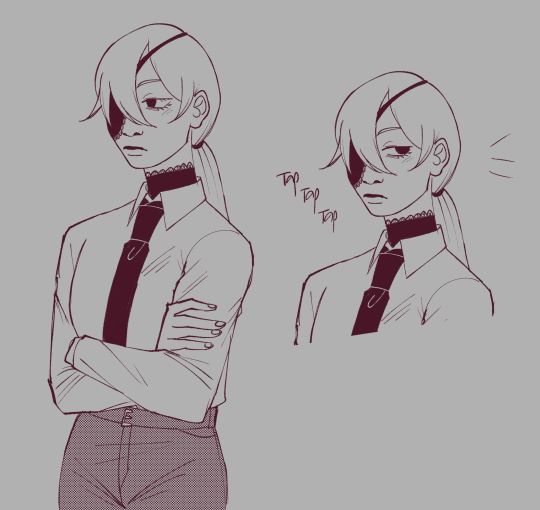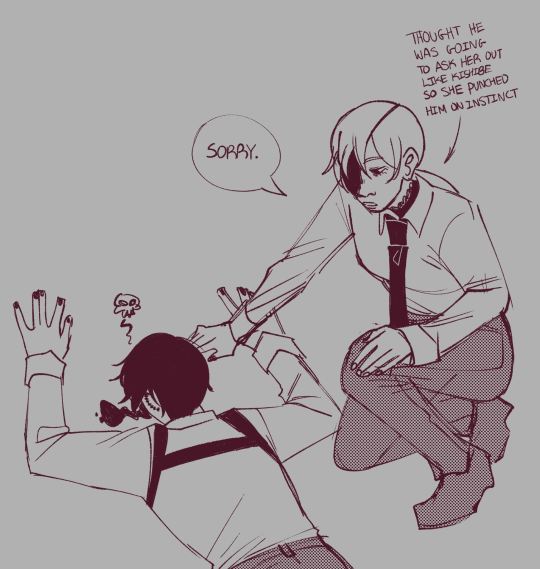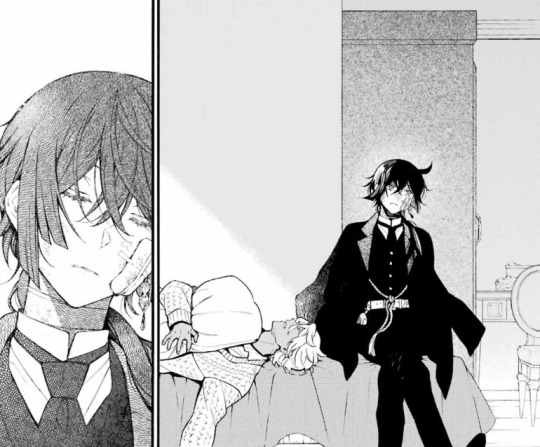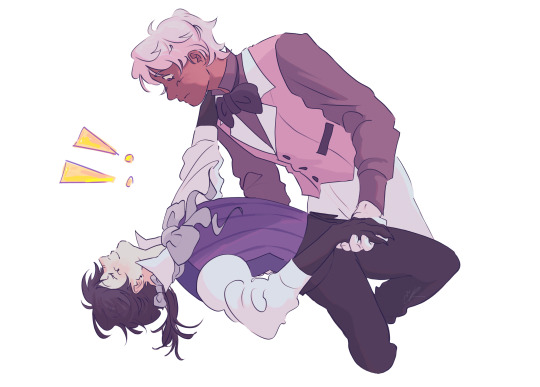Note
analyze the ball kicking scene 🫶🏼 (out of joke, love your posts <3)
Yes, even kicking balls has symbolism in Chainsaw Man

You're joking, Anon, but I wanted to do a post about it yesterday, and now you've given me the opportunity.
Everything in this chapter is about the symbolism of kicking balls, yes, even the beginning!
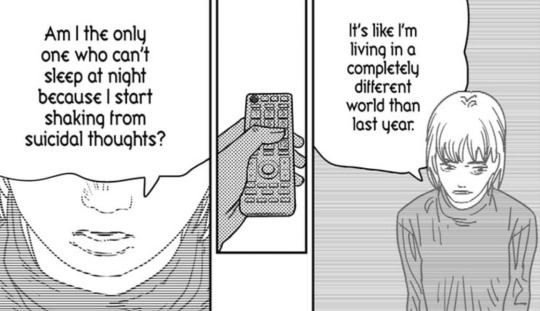
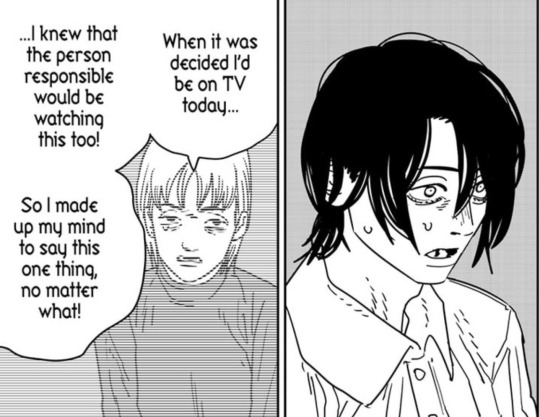
Haruka Iseumi flicks through several TV channels, rather blasély, until he comes across a woman whose speech seems to resonate with him, a woman who seems to feel betrayed, disoriented like these teenagers who have been put in danger by an institution that has never seen their good, the church. But this girl only talks about her disappointment following a scandal surrounding over-mediatized stars.

What Haruka is going through right now is disillusionment, believing that his problems would have been taken seriously, his situation as an escaped high school terrorist, would have interested the public. But people prefer not to face up to these kinds of problems; an epidemic of people turned into demons is as commonplace as wars. To avoid jeopardizing personal comfort, people prefer to focus on other problems.
Because people literally don't have the balls to face reality.
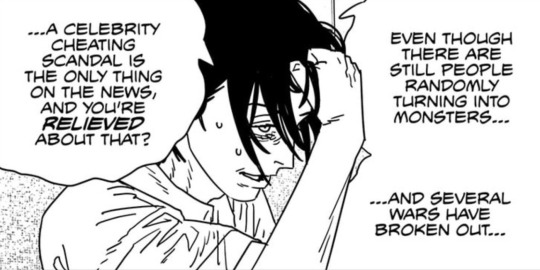
But contrary to what Haruka thinks, he's not so different: he's also an angst-ridden child who had totally surrendered to his idol, Chainsaw Man, to the point of convincing himself that he was bound to him, even pretending to be him for a semblance of trust. What the chapter seems to show is that Haruka is more down to earth than that girl on TV, but what it really shows is that he's exactly like that girl, but no longer admits it to himself.
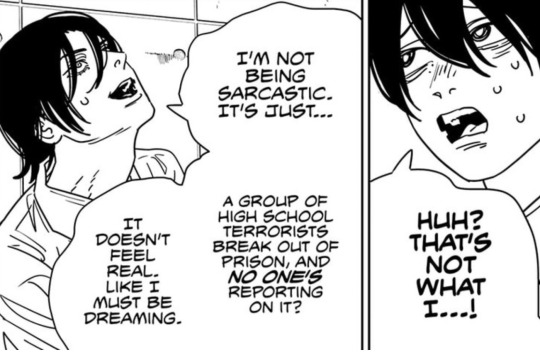
No, Haruka, you're not dreaming, or rather you have been until now and now you can't do it anymore.
Because you've reached his idol, you have literally reassembled his image, you've seen the boy you have no interest in behind that reassuring mask.


What this chapter is about is the illusion into which we accept to insert ourselves in order to better resist our fears and existential ills.
Denji doesn't have to exist to shatter the illusions he needs to survive; even his awakening and his speech are too much, as his image no longer matches the one he wears as a universal puppet. He's literally cuter when he's inanimate, because that's what he's made for. At least, that's the only way we accept him. He's made to fill your person, and it's impossible for Chainsaw Man to be a person in his own right.
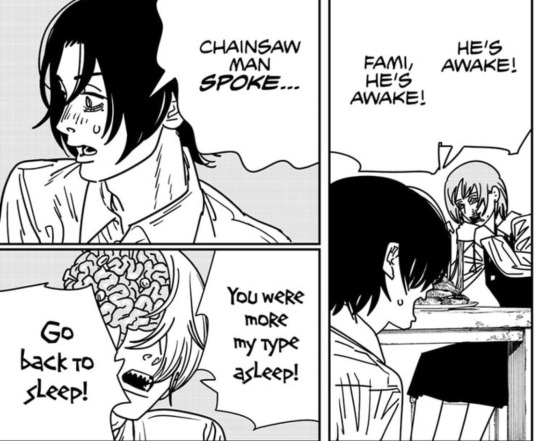
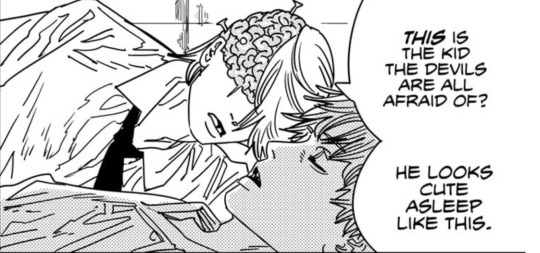
As proof of this, when Denji wakes up, his first reflex is not to discover that he's complete again, for he exists only to fill others, hence his question to Asa as to where her arm has gone. Unknowingly, Denji has accepted his role.

For Katana Man and Yoru, Chainsaw Man is a goal, a dream to be achieved. Seeing the person behind it, the other half, disturbs them. Considering it might even make them reconsider their choices.
Katana Man has deluded himself into believing that Denji no longer has the heart of a man, that he was his grandfather's tormentor and not the child who was the victim. He needs this revenge to move forward, just as Yoru, as a war demon, needs to fight an unattainable adversary to continue wreaking havoc.
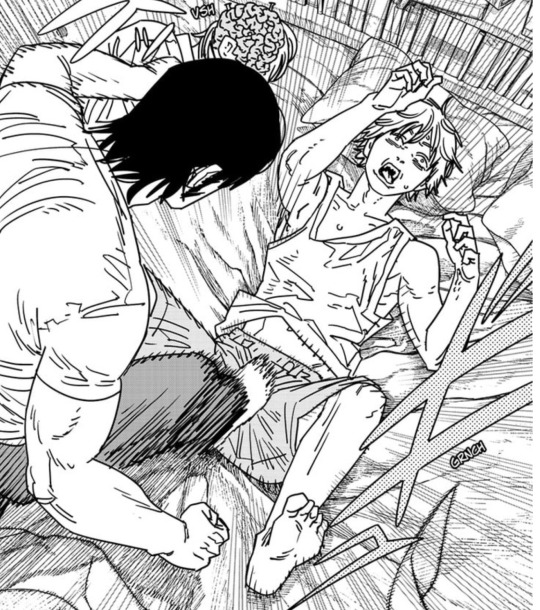

But what's that got to do with it? What does this have to do with beating Denji's balls off?
Who kicked Katana Man in the balls? Aki and Denji. If Chainsaw Man is the metaphor for the comforting illusion of others, Aki is the symbol that revenge (often impossible) is a long-term, survival goal for hearts scarred by resentment. Beating the balls off? The meeting of the two.
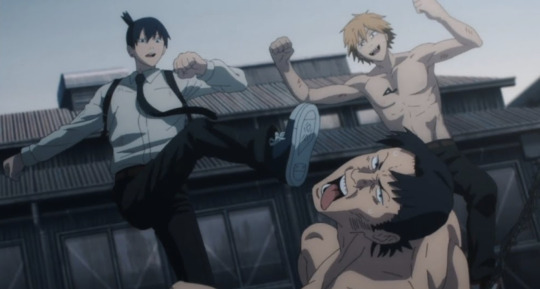
When Aki and Denji beat up Katana Man, the illusion of a proud, virile, traditional man who swore by his honor had been shattered. What Katana Man represented to himself and to the readers, this formidable adversary, had been dismantled.
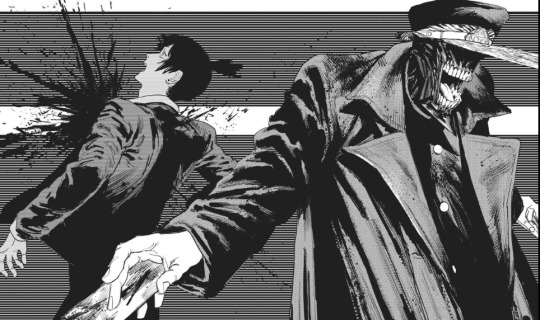
But above all, this was a gentle, more accessible form of revenge, one that would allow us to survive, a way for Aki to avenge Himeno in her own way, without actually avenging her. It's about beating your opponent while admitting you've lost in some way.

Similarly, when Katana Man and Yoru defeat Denji, they lead to a renewed desire to dismantle Chainsaw Man's image. To bring it together as their long-term goal of revenge.
But despite this balance of power, this gesture symbolically demonstrates that they are not certain of their victory.

Above all, the important answer in this chapter is once again in the background.
Fami continues to eat undisturbed. She eats all the time, but in this chapter, she seemed almost to be regaining her strength.
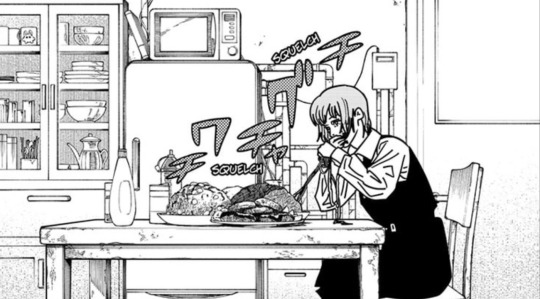
Why was that?
Her plan was clear, to make people fear Chainsaw Man as well as the war, to make Yoru and Chainsaw Man champions. But what about the media? They prefer to do what's most profitable, keeping viewers entertained for as long as possible, so that they forget about the real issues.
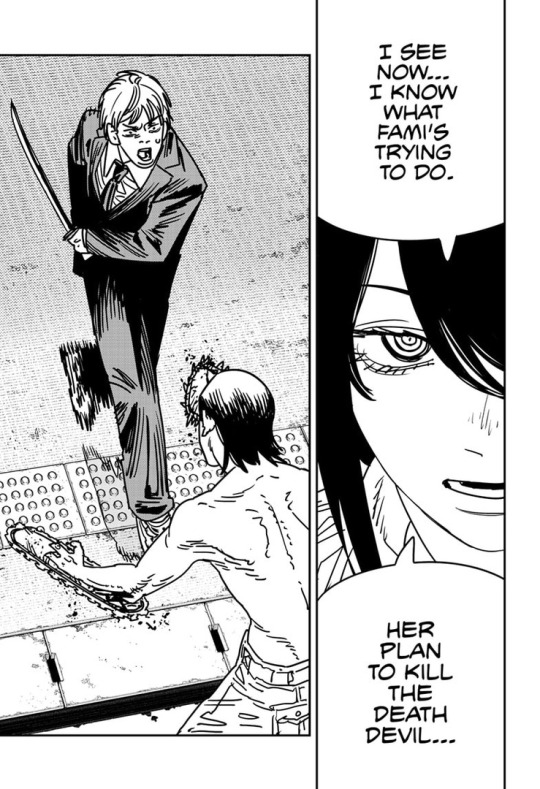
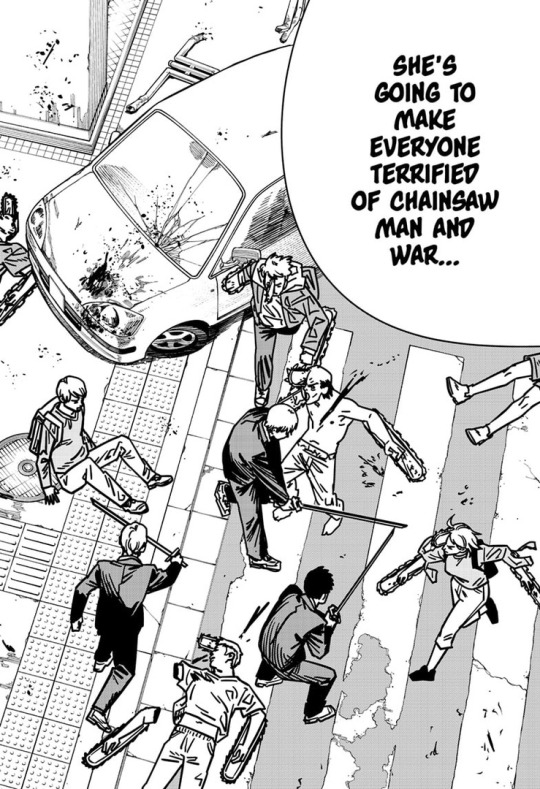
People prefer to delude themselves, to dream dreams, rather than focus on reality, so will Chainsaw Man and Yoru have their strength increased to the point where they'll be potential opponents for death?
because people are already escaping the fear of death through entertainment, which is even the best champion.
Instead of thinking about our existential crises, we flood our brains with unimportant information.
As the philosopher Pascal would say: "Since men have not been able to cure death, misery and ignorance, they have decided, in order to make themselves happy, not to think about them. Notwithstanding these miseries, he wants to be happy, and only wants to be happy, and cannot not want to be happy".
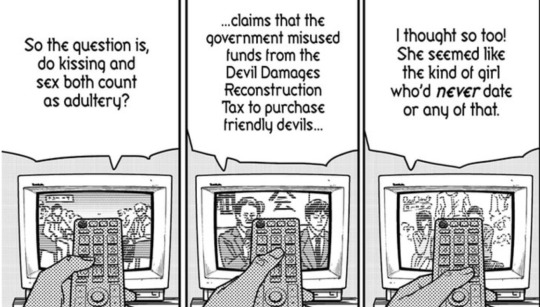
But let's close this loop of questions: if Chainsaw Man allows this comforting disillusionment, Denji is the opposite, something we refuse to see, if Chainsaw Man is a dream, Denji is reality. Let's get back to our main subject: beating up balls.
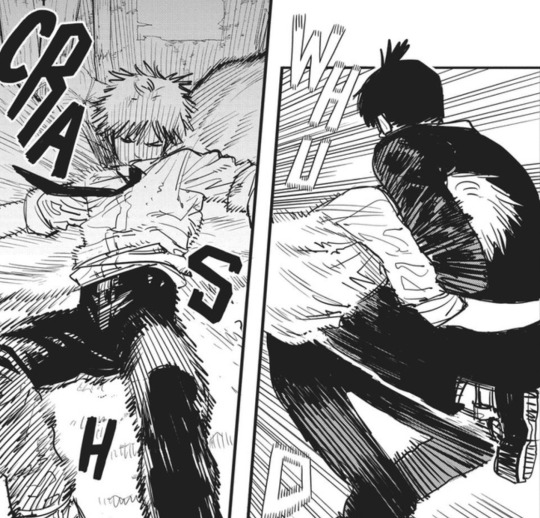


When Aki first beat Denji up, he wanted to disgust him enough to prevent him from signing up as a public hunter. Literally, he preferred to spare Denji from reality, by killing the symbol that is Denji (did you miss the headaches I caused?). But when Denji retaliates, to insist that he wants to enlist, it's the other way around: it's the harshness of reality that Denji fully accepts that will prevail over Aki's attempt to protect him.


When Katana Man and Yoru beat Denji's balls off, in reality they're trying to fight the reality of what Chainsaw Man is, this mixture between a boy, reality, and the bloodthirsty enemy, the dream, Chainsaw Man. Beating up Denji is an attempt to avoid the harshness of life. It's that illusion.
So when Denji helped Aki beat up Katana Man, he allowed him to escape his survival mechanisms, his revenge, his illusion, by enjoying the present moment, pure reality.
But when Denji defeated Aki, it was also the announcement of the reality of Aki's fate, which would outweigh this illusion - the success of his revenge.
That's why Pochita, the dream and illusion, prevents Denji from opening the door. When Denji sees reality, he can't help opening it. Just as Makima concentrated on her Chainsaw Man dream without seeing reality, Denji right behind it.
Just as the dream allows Denji to escape reality, the contract between Denji and Pochita has allowed Denji to become someone else, escaping from himself, himself a victim of the dream without being able to know exactly what he is.
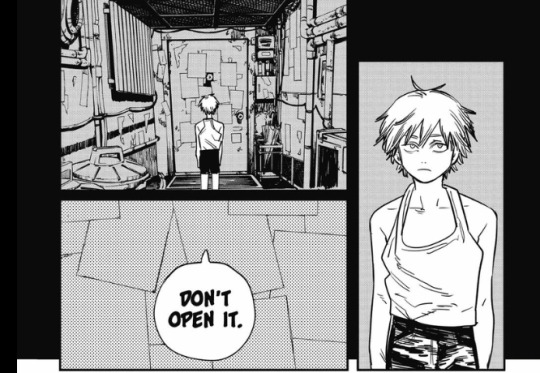

But don't forget, beating the balls off is Denji's tactic.
Why is that? Because no matter how hard you try to escape it, reality will always prevail.
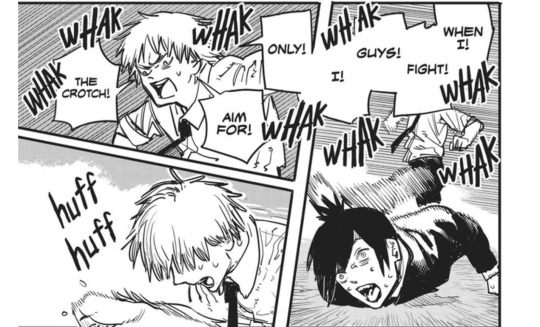
190 notes
·
View notes
Text
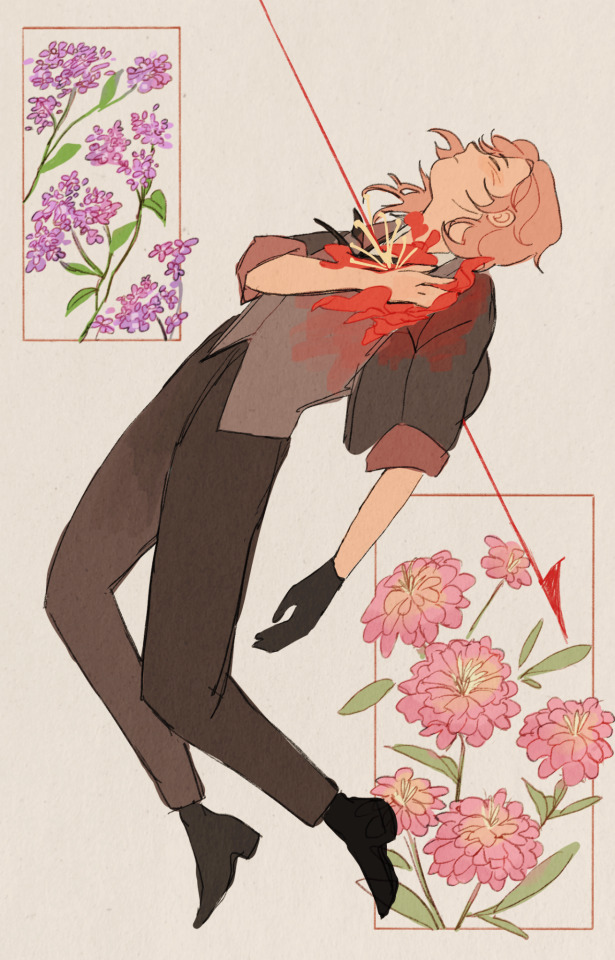
bleeding from the heart
uhh red camellia (love), zinnia (thoughts of absent friends), heliotrope (devotion)
for chuuya week day 2: flower language ^^
2K notes
·
View notes
Text
I need a way to say this character makes me feel insane amounts of lust but not in a sexual or romantic way
19K notes
·
View notes
Text
yoshida: you want to fight? let's fucking go then.
yoshida: *takes off an earring*
yoshida: *takes off another earring*
yoshida: *takes off another earring*
yoshida: *takes off another—
36 notes
·
View notes
Text


father and son
yapping underneath
i'm not good w/ words but you guys have to understand my vision here: connor, basically a dog to the police. wants to carry out his mission no matter what, but his own emotions poke holes into his will and he starts doubting what he was programmed to do. i feel like yoshida's starting on an arc like that. in part one he wasn't really told much and he wasn't curious enough to dig. no additional details, just paid to do his job. but in part 2 he's emotionally invested in a way. he's developed (or tried to develop) relationships with both the war fiend AND chainsaw man. so now guilt follows whenever he carries out his job's demands—an emotion he isn't used to feeling when doing his job.
410 notes
·
View notes
Text
Shout out to the canon vnc streamer AU. I have no idea if people have made fan content of this but it’s hilarious

Vanitas being a gamer is somehow not surprising to me. The rage-quitting even less so. Loser (affectionate).
also….
Noé (a cat owner): Omg guys I found a cat :D !!
Plastic bag: *rustles*
Chat: if Noé says it’s a cat, it is a cat.
227 notes
·
View notes
Text
Vanoé: A Love Confession in Sheep's Clothing
People on Twitter where discussing the possibility of Vanoé ever being “canon” and since this was something I was going to work on for the video essay, anyway, I thought why not post about it on tumblr and get people’s feedback, first.
My argument here is fairly simple: I don’t think that Vanoé will be canon-canon (as in Kiss, kiss, fall in love), which is mostly due to the Japanese publishing landscape and my inability to think that anything casually homosexual happening outside of BL/GL genres would actually be confirmed. (I believe in MochiJun, I really do, I just do not believe in Japanese publishers.)
But I think that Noé realizing his love for Vanitas isn’t out of the question.
I’d like to refer back to a previous post I made in which I discussed Noé’s question about “love” and the usage of ai/koi in Japanese language. Put very briefly, I mentioned that there are two words for “love” in Japanese, ai and koi. Whereas ai has an encompassing meaning like romantic love, familial love, friendship love etc. koi is usually exclusively used for romantic love (i.e. love in which sexual desire is involved, for all my allo readers).
In the ball scene, Noé very explicitly enquires about the latter. He doesn’t want Vanitas to give him a run-down on “love” but an explanation on what it feels like to be in love with someone. There is no mistaking that question for anything but Noé bluntly asking Vanitas about clarification on romantic feelings.
Another thing I mentioned in that post that will be important here is how love confessions are usually phrased in Japanese. Yes, yes, “aishiteiru” exists, but people rarely use it and even in media it comes off feeling weirdly…strong. It is often used when translating Western media, as far as I know, but it’s rarely used in media that was originally written/produced in Japanese.
People would just stick to “suki” or “daisuki” which, yes, can be used to tell someone you like them platonically as much as to tell them that you have a major crush on them. It’s often used for comedic purposes, as well and can sometimes be confusing.
And it’s the word Noé uses to tell Vanitas that he “really doesn’t like him”.
In this post I will argue that Noé’s consistent affirmation that he doesn’t like Vanitas is actually just a love confession in reverse. Rather, I’d argue that it’s a clever set-up that will require a payoff in the later course of the story.
As far as I recall, there are three of these “reverse love confessions” coming from Noé. The first one happens right in Chapter 2 when Vanitas presses Noé for the reason why he doesn’t want to work with him.
The scene is a pretty obvious parody of Shōjo manga confessions, or at least scenes in which Shōjo protagonists realize that their feelings are of a romantic nature. I mean, here we have Noé, recalling every single interaction he’s had with Vanitas so far (which, aren’t that many) and in his mind’s eye he flips through Vanitas’ various faces and expressions. It’s MochiJun playing with our expectations and building tension for an amazing punchline. It’s a great set-up of their future relationship, too. This reluctance to be together that somehow turns into an unlikely companionship. (The panel setup always reminds me of the Ganbare, Nakamura-kun cover/meme, if I am being honest.)
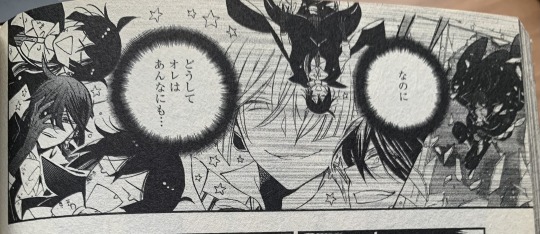
Do I think Noé is being delusional here? Kind of. I wouldn’t go as far as saying that he has actually developed a crush on Vanitas and doesn’t know how to place the feeling so he misinterprets it as disgust. (There’s sth weirdly queer about that, but I digress.) Of course, it could be that Noé has actually just misunderstood his fascination with Vanitas as infatuation. But I would believe him here when he says that he doesn’t find Vanitas agreeable to be around and thus would rather keep his distance.
Maybe he is misjudging his own feelings here. But I think he might just be genuine.
The second time he feels the need to tell Vanitas just how much he doesn’t like him is the Bell Tower Scene, ironically.
The Bell Tower Scene is such a grand turning point in their relationship that it does warrant capital letters. I don’t know how much of a turning point it really is for Vanitas, because, Vanitas, from the very beginning, has wanted to be around Noé. He does argue with him a lot and voice a lot of his irritation with Noé and Noé’s unwavering optimism and naiveté. But there is not anything that would make me believe he genuinely dislikes Noé.
It's later revealed that, probably, the reason he was sulking at the beginning of this scene was because he was angry at Noé for having protected him from Lord Ruthven at the ball. Those feelings are born from Vanitas’ self-loathing, I’d argue, rather than him worrying about Noé, but I would still think that the latter played a part in how fed-up he was with Noé here.
But Noé, on the other hand, has had a hard time wrapping his head around his feelings for Vanitas. Vanitas, to him, is an enigma. Noé doesn’t hide the fact that he hasn’t got a single clue what Vanitas is thinking or what the inner workings of the younger look like. The Masquerade is the momentum that makes Noé reflect on his opinion on Vanitas. He himself says that he put Vanitas on a pedestal, of sorts, and put all his hopes, aspirations and wishes in Vanitas. I’d say you could go so far as to say that Noé even idolized Vanitas as this ideal savior that was going to accomplish everything Noé couldn’t.
But he comes to realize that Vanitas isn’t that. That Vanitas is trying his best to fulfill a goal he set himself even if it means facing self-destruction in the process. He decides not to judge Vanitas by his own standards, to unlearn everything he thought he knew so far and to learn about Vanitas anew.
The Bell Tower Scene is Vanitas forcibly putting up his walls and Noé tearing them down with this strange mixture of force and tenderness.
Noé disregards Vanitas wish to part with him. He denies it, saying he can do so because he “doesn’t even like” Vanitas. There is no reason for him to act according to Vanitas’ wishes. He doesn’t owe Vanitas anything.
They are two individuals who just happen to be involved in the same mess.
It’s almost cute when Noé looks at Vanitas and what he thinks next is that the man interests him. He doesn’t understand Vanitas at all – but he wants to.
There is this longing desire to solve the riddle that is the man in front of him. (I’m ace, probably aro, so take this with a grain of salt but to me) The Bell Tower Scene is so inherently romantic. It’s Noé choosing to disregard Vanitas’ flaws and to put aside the things he dislikes about him for a second to instead choose to get to know Vanitas. It will take effort, but he chooses to stay with Vanitas and see everything through to the end. It’s Noé being extremely selfish. He is no longer acting on Sensei’s orders but on his own volition.
And he says as much when he quotes Vanitas’ own words.
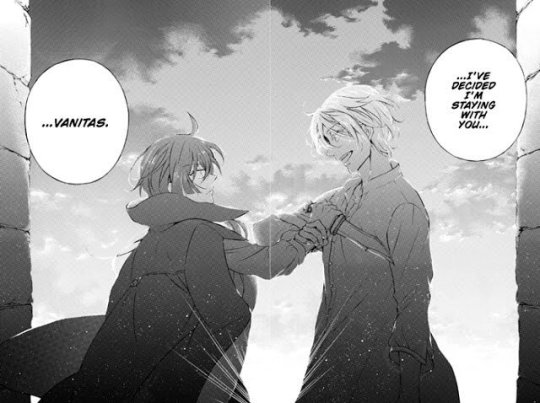
Is Noé saying he doesn’t like Vanitas here still a lie? Eh. I’d reckon he doesn’t like him all that much yet, still.
It’s not a matter of Noé disliking Vanitas as a person, I don’t think. It feels a little more like frustration at being unable to wrap his head around this strange person. This frustration that comes with trying and trying and the other party not making it any easier for you.
Vanitas isn’t as open about his feelings as Noé is. He is not opening his heart to the other but keeps him at arm’s length, seemingly only using Noé as his shield, when both the reader and Noé, by now, should know that that is not true.
And I think Noé is beginning to understand that so much of Vanitas is just an act. I think he’s beginning to understand that he wants to know what – who – Vanitas is beneath all these masks. Because perhaps Noé thinks he might like who he will get to meet at the end of that long, arduous journey.
Noé is gambling. Perhaps he’s being a little childish. He doesn’t like him – yet. But one day he might.
On another day I will talk about how this major turning point in their relationship is literally followed by Noé asking Vanitas about romantic love and then lamenting Vanitas and Jeanne’s relationship and lusting for Vanitas’ blood but – not today. There’s so much to unpack here.
Just this much: The Ball ends with a set-up that is so blunt and ambiguous that MochiJun cannot really do anything with it other than to include its payoff later in the story.

In my previous post I talked about how this sentence doesn’t make much sense if it’s just alluding to Noé falling for either Domi or Jeanne in the future. The buildup isn’t there and nothing in the scene properly suggests that Noé has eyes for anyone but Vanitas during the ball. The scene even goes so far as to refer back to Noé’s resolution that occurred during the Bell Tower scene. He once again acknowledges that he doesn’t understand Vanitas at all. It feels, if anything, like another affirmation that he doesn’t understand – but he wants to.

A/N: The English translation seems to have turned it into “I really don’t understand him at all” or something along those lines when Noé actually just acknowledges that “There are so many things I don’t understand”. It’s more ambiguous and probably doesn’t refer solely to Vanitas but rather to his own lack of knowledge on (romantic) love.
The Catacombs Arc and the Gévaudan Arc follow but for brevity’s sake, I will fast forward to the café talk Vincent, uh, Vanitas has with Roland Olivier after the Gévaudan Arc ends.
There is absolutely no reason for Noé to be present in this scene. There is no reason for him to overhear Vanitas admit to his self-hatred and self-loathing. “But he is the narrator!” Hush, child, I do not have the time to cover this today. (We are being shown /so many/ scenes in which Noé isn’t physically present. Noé not being at the scene of crime has never stopped MochiJun from showing us certain scenes. Why should this one be different?)
But Noé is there. He overhears their talk and is seemingly affected by Vanitas’ words. It’s an interesting choice on MochiJun’s part that we don’t get any internal monologue here. Noé simply learns about it. He looks surprised, sure, but there is no grand reaction and no attempt of him trying to verbalize his feelings after having overheard this grand revelation about Vanitas as a person.
He chases Vanitas home, afterwards, and is there for him. The whole “throwing a blanket on someone affectionately” ironically feels a lot like Vanitas’ love language. But Noé wouldn’t be Noé if he didn’t verbalize his feelings. – and verbalize he does.
He muses about the butterfly effect and how everything could have been so different if Vanitas had not been himself. After learning about Vanitas’ self-hatred he affirms Vanitas’ entire being. It is not a die-hard effort of encouraging Vanitas to love himself. Noé doesn’t go down the road of pressuring Vanitas into dubious positivity and self-love.
But he takes the time to make Vanitas realize that who he is good. That who he is, is enough.
(If that’s not love then I do not know what is.)
Something is worth mentioning here, though. Noé is extremely cautious about not drastically changing the course of their relationship. He keeps their usual bickering and banter in check by reassuring Vanitas that he “still doesn’t like him”. If Noé repeats this, and Vanitas knows this, then nothing has to change. If Noé doesn’t like Vanitas, if they still don’t like each other, then that intimate declaration of Noé’s just now has no Earth-shattering impact. Then nothing has to change.
But something has changed.
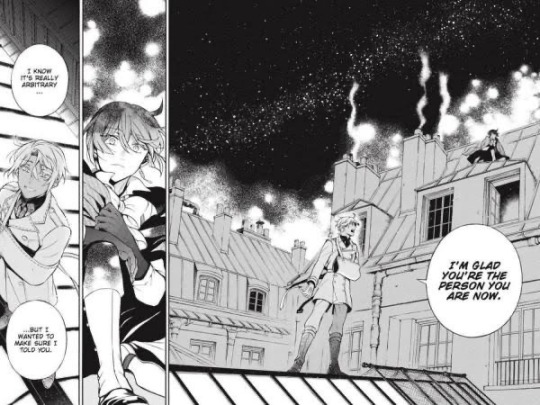
I’m not an Art Major (Japanology and Music, actually) but I think the juxtaposition with the Bell Tower Scene is quite interesting. Even the reverse confession in Chapter 2, if you think about it. Before, when we had these major turning points in their relationship they were physically close. Together in more or less enclosed spaces. But here there is quite a lot of distance between them. And it’s interesting to note that Noé puts it there.
Usually Vanitas is the one who runs and seeks to put distance between himself and whatever distresses him. He seeks escape on the roof. But this time, it’s Noé who leaps onto the roof below as he pours his heart out.
Is it to protect himself from this vulnerability? Or is it to make Vanitas more comfortable? Is he trying to hide from the man he is being so intimate with? Or is he giving Vanitas room to escape if he needs to?
I can’t answer this. I don’t know if I want to.
Noé still doesn’t like Vanitas. He says as much. But this time, it’s a lie. An obvious one. Like. Look at that cocky grin.

Now he knows what Vanitas’ inside looks like. At the ball, Vanitas had already told him that he has no interest in any person that would ever fall for him.
But now Noé knows that this feeling is born from intense self-hatred. Noé isn’t stupid. Quite the opposite. I think we can all acknowledge how emotionally intelligent Noé is.
He likes Vanitas. He knows that now. Or at least he doesn’t not like him. But he also knows that if he acknowledged that fact verbally he would scare Vanitas off.
And that is the last thing Noé wants to do. He wants to keep Vanitas close. It’s the selfish wish he has, which has been established in the Bell Tower Scene.
We could argue that all this culminates in the “I will never set you free” scene. People have elaborated on this one and have written essays on it and this is already ridiculously long, so I won’t do this here.
But this is Noé promising Vanitas eternity. The tiny glimpse of it they’ll have, anyway. It’s a threat as much as it is an oath.
It is Noé outright admitting what he has been scared to admit to before. He likes Vanitas. Loves him, even.
Love comes in many forms. And this is one of them.

But, personally, I think this isn’t the payoff of the reverse love confession as much as it is a checkpoint. Noé said it himself. He wouldn’t come to realize the true meaning behind his heart racing that night until much later.
I have a feeling MochiJun will explicitly tell us when that time has come. For all we know, it might not come until much later. Maybe after Vanitas has died.
“But, why do you call it a reverse love confession? Why love?” Glad you asked!
Because we already established that “suki” is not limited to platonic feelings. People confess to their crushes with “suki”. If you turned someone down who confessed to you, you could say what Noé said: そんなに好きではありません。
This, paired with Noé asking about romantic love, the ambiguous ending to the ball scene AND Noé thirsting after Vanitas(‘ blood)? Reads like a perfect buildup for a love story.
However unrequited it might be.
And after all, MochiJun did say that she wanted to write more about love. Maybe she decided to write about more than just one love story.
213 notes
·
View notes
Text
Vanoé: A Love Confession in Sheep's Clothing
People on Twitter where discussing the possibility of Vanoé ever being “canon” and since this was something I was going to work on for the video essay, anyway, I thought why not post about it on tumblr and get people’s feedback, first.
My argument here is fairly simple: I don’t think that Vanoé will be canon-canon (as in Kiss, kiss, fall in love), which is mostly due to the Japanese publishing landscape and my inability to think that anything casually homosexual happening outside of BL/GL genres would actually be confirmed. (I believe in MochiJun, I really do, I just do not believe in Japanese publishers.)
But I think that Noé realizing his love for Vanitas isn’t out of the question.
I’d like to refer back to a previous post I made in which I discussed Noé’s question about “love” and the usage of ai/koi in Japanese language. Put very briefly, I mentioned that there are two words for “love” in Japanese, ai and koi. Whereas ai has an encompassing meaning like romantic love, familial love, friendship love etc. koi is usually exclusively used for romantic love (i.e. love in which sexual desire is involved, for all my allo readers).
In the ball scene, Noé very explicitly enquires about the latter. He doesn’t want Vanitas to give him a run-down on “love” but an explanation on what it feels like to be in love with someone. There is no mistaking that question for anything but Noé bluntly asking Vanitas about clarification on romantic feelings.
Another thing I mentioned in that post that will be important here is how love confessions are usually phrased in Japanese. Yes, yes, “aishiteiru” exists, but people rarely use it and even in media it comes off feeling weirdly…strong. It is often used when translating Western media, as far as I know, but it’s rarely used in media that was originally written/produced in Japanese.
People would just stick to “suki” or “daisuki” which, yes, can be used to tell someone you like them platonically as much as to tell them that you have a major crush on them. It’s often used for comedic purposes, as well and can sometimes be confusing.
And it’s the word Noé uses to tell Vanitas that he “really doesn’t like him”.
In this post I will argue that Noé’s consistent affirmation that he doesn’t like Vanitas is actually just a love confession in reverse. Rather, I’d argue that it’s a clever set-up that will require a payoff in the later course of the story.
As far as I recall, there are three of these “reverse love confessions” coming from Noé. The first one happens right in Chapter 2 when Vanitas presses Noé for the reason why he doesn’t want to work with him.
The scene is a pretty obvious parody of Shōjo manga confessions, or at least scenes in which Shōjo protagonists realize that their feelings are of a romantic nature. I mean, here we have Noé, recalling every single interaction he’s had with Vanitas so far (which, aren’t that many) and in his mind’s eye he flips through Vanitas’ various faces and expressions. It’s MochiJun playing with our expectations and building tension for an amazing punchline. It’s a great set-up of their future relationship, too. This reluctance to be together that somehow turns into an unlikely companionship. (The panel setup always reminds me of the Ganbare, Nakamura-kun cover/meme, if I am being honest.)

Do I think Noé is being delusional here? Kind of. I wouldn’t go as far as saying that he has actually developed a crush on Vanitas and doesn’t know how to place the feeling so he misinterprets it as disgust. (There’s sth weirdly queer about that, but I digress.) Of course, it could be that Noé has actually just misunderstood his fascination with Vanitas as infatuation. But I would believe him here when he says that he doesn’t find Vanitas agreeable to be around and thus would rather keep his distance.
Maybe he is misjudging his own feelings here. But I think he might just be genuine.
The second time he feels the need to tell Vanitas just how much he doesn’t like him is the Bell Tower Scene, ironically.
The Bell Tower Scene is such a grand turning point in their relationship that it does warrant capital letters. I don’t know how much of a turning point it really is for Vanitas, because, Vanitas, from the very beginning, has wanted to be around Noé. He does argue with him a lot and voice a lot of his irritation with Noé and Noé’s unwavering optimism and naiveté. But there is not anything that would make me believe he genuinely dislikes Noé.
It's later revealed that, probably, the reason he was sulking at the beginning of this scene was because he was angry at Noé for having protected him from Lord Ruthven at the ball. Those feelings are born from Vanitas’ self-loathing, I’d argue, rather than him worrying about Noé, but I would still think that the latter played a part in how fed-up he was with Noé here.
But Noé, on the other hand, has had a hard time wrapping his head around his feelings for Vanitas. Vanitas, to him, is an enigma. Noé doesn’t hide the fact that he hasn’t got a single clue what Vanitas is thinking or what the inner workings of the younger look like. The Masquerade is the momentum that makes Noé reflect on his opinion on Vanitas. He himself says that he put Vanitas on a pedestal, of sorts, and put all his hopes, aspirations and wishes in Vanitas. I’d say you could go so far as to say that Noé even idolized Vanitas as this ideal savior that was going to accomplish everything Noé couldn’t.
But he comes to realize that Vanitas isn’t that. That Vanitas is trying his best to fulfill a goal he set himself even if it means facing self-destruction in the process. He decides not to judge Vanitas by his own standards, to unlearn everything he thought he knew so far and to learn about Vanitas anew.
The Bell Tower Scene is Vanitas forcibly putting up his walls and Noé tearing them down with this strange mixture of force and tenderness.
Noé disregards Vanitas wish to part with him. He denies it, saying he can do so because he “doesn’t even like” Vanitas. There is no reason for him to act according to Vanitas’ wishes. He doesn’t owe Vanitas anything.
They are two individuals who just happen to be involved in the same mess.
It’s almost cute when Noé looks at Vanitas and what he thinks next is that the man interests him. He doesn’t understand Vanitas at all – but he wants to.
There is this longing desire to solve the riddle that is the man in front of him. (I’m ace, probably aro, so take this with a grain of salt but to me) The Bell Tower Scene is so inherently romantic. It’s Noé choosing to disregard Vanitas’ flaws and to put aside the things he dislikes about him for a second to instead choose to get to know Vanitas. It will take effort, but he chooses to stay with Vanitas and see everything through to the end. It’s Noé being extremely selfish. He is no longer acting on Sensei’s orders but on his own volition.
And he says as much when he quotes Vanitas’ own words.

Is Noé saying he doesn’t like Vanitas here still a lie? Eh. I’d reckon he doesn’t like him all that much yet, still.
It’s not a matter of Noé disliking Vanitas as a person, I don’t think. It feels a little more like frustration at being unable to wrap his head around this strange person. This frustration that comes with trying and trying and the other party not making it any easier for you.
Vanitas isn’t as open about his feelings as Noé is. He is not opening his heart to the other but keeps him at arm’s length, seemingly only using Noé as his shield, when both the reader and Noé, by now, should know that that is not true.
And I think Noé is beginning to understand that so much of Vanitas is just an act. I think he’s beginning to understand that he wants to know what – who – Vanitas is beneath all these masks. Because perhaps Noé thinks he might like who he will get to meet at the end of that long, arduous journey.
Noé is gambling. Perhaps he’s being a little childish. He doesn’t like him – yet. But one day he might.
On another day I will talk about how this major turning point in their relationship is literally followed by Noé asking Vanitas about romantic love and then lamenting Vanitas and Jeanne’s relationship and lusting for Vanitas’ blood but – not today. There’s so much to unpack here.
Just this much: The Ball ends with a set-up that is so blunt and ambiguous that MochiJun cannot really do anything with it other than to include its payoff later in the story.

In my previous post I talked about how this sentence doesn’t make much sense if it’s just alluding to Noé falling for either Domi or Jeanne in the future. The buildup isn’t there and nothing in the scene properly suggests that Noé has eyes for anyone but Vanitas during the ball. The scene even goes so far as to refer back to Noé’s resolution that occurred during the Bell Tower scene. He once again acknowledges that he doesn’t understand Vanitas at all. It feels, if anything, like another affirmation that he doesn’t understand – but he wants to.

A/N: The English translation seems to have turned it into “I really don’t understand him at all” or something along those lines when Noé actually just acknowledges that “There are so many things I don’t understand”. It’s more ambiguous and probably doesn’t refer solely to Vanitas but rather to his own lack of knowledge on (romantic) love.
The Catacombs Arc and the Gévaudan Arc follow but for brevity’s sake, I will fast forward to the café talk Vincent, uh, Vanitas has with Roland Olivier after the Gévaudan Arc ends.
There is absolutely no reason for Noé to be present in this scene. There is no reason for him to overhear Vanitas admit to his self-hatred and self-loathing. “But he is the narrator!” Hush, child, I do not have the time to cover this today. (We are being shown /so many/ scenes in which Noé isn’t physically present. Noé not being at the scene of crime has never stopped MochiJun from showing us certain scenes. Why should this one be different?)
But Noé is there. He overhears their talk and is seemingly affected by Vanitas’ words. It’s an interesting choice on MochiJun’s part that we don’t get any internal monologue here. Noé simply learns about it. He looks surprised, sure, but there is no grand reaction and no attempt of him trying to verbalize his feelings after having overheard this grand revelation about Vanitas as a person.
He chases Vanitas home, afterwards, and is there for him. The whole “throwing a blanket on someone affectionately” ironically feels a lot like Vanitas’ love language. But Noé wouldn’t be Noé if he didn’t verbalize his feelings. – and verbalize he does.
He muses about the butterfly effect and how everything could have been so different if Vanitas had not been himself. After learning about Vanitas’ self-hatred he affirms Vanitas’ entire being. It is not a die-hard effort of encouraging Vanitas to love himself. Noé doesn’t go down the road of pressuring Vanitas into dubious positivity and self-love.
But he takes the time to make Vanitas realize that who he is good. That who he is, is enough.
(If that’s not love then I do not know what is.)
Something is worth mentioning here, though. Noé is extremely cautious about not drastically changing the course of their relationship. He keeps their usual bickering and banter in check by reassuring Vanitas that he “still doesn’t like him”. If Noé repeats this, and Vanitas knows this, then nothing has to change. If Noé doesn’t like Vanitas, if they still don’t like each other, then that intimate declaration of Noé’s just now has no Earth-shattering impact. Then nothing has to change.
But something has changed.

I’m not an Art Major (Japanology and Music, actually) but I think the juxtaposition with the Bell Tower Scene is quite interesting. Even the reverse confession in Chapter 2, if you think about it. Before, when we had these major turning points in their relationship they were physically close. Together in more or less enclosed spaces. But here there is quite a lot of distance between them. And it’s interesting to note that Noé puts it there.
Usually Vanitas is the one who runs and seeks to put distance between himself and whatever distresses him. He seeks escape on the roof. But this time, it’s Noé who leaps onto the roof below as he pours his heart out.
Is it to protect himself from this vulnerability? Or is it to make Vanitas more comfortable? Is he trying to hide from the man he is being so intimate with? Or is he giving Vanitas room to escape if he needs to?
I can’t answer this. I don’t know if I want to.
Noé still doesn’t like Vanitas. He says as much. But this time, it’s a lie. An obvious one. Like. Look at that cocky grin.

Now he knows what Vanitas’ inside looks like. At the ball, Vanitas had already told him that he has no interest in any person that would ever fall for him.
But now Noé knows that this feeling is born from intense self-hatred. Noé isn’t stupid. Quite the opposite. I think we can all acknowledge how emotionally intelligent Noé is.
He likes Vanitas. He knows that now. Or at least he doesn’t not like him. But he also knows that if he acknowledged that fact verbally he would scare Vanitas off.
And that is the last thing Noé wants to do. He wants to keep Vanitas close. It’s the selfish wish he has, which has been established in the Bell Tower Scene.
We could argue that all this culminates in the “I will never set you free” scene. People have elaborated on this one and have written essays on it and this is already ridiculously long, so I won’t do this here.
But this is Noé promising Vanitas eternity. The tiny glimpse of it they’ll have, anyway. It’s a threat as much as it is an oath.
It is Noé outright admitting what he has been scared to admit to before. He likes Vanitas. Loves him, even.
Love comes in many forms. And this is one of them.

But, personally, I think this isn’t the payoff of the reverse love confession as much as it is a checkpoint. Noé said it himself. He wouldn’t come to realize the true meaning behind his heart racing that night until much later.
I have a feeling MochiJun will explicitly tell us when that time has come. For all we know, it might not come until much later. Maybe after Vanitas has died.
“But, why do you call it a reverse love confession? Why love?” Glad you asked!
Because we already established that “suki” is not limited to platonic feelings. People confess to their crushes with “suki”. If you turned someone down who confessed to you, you could say what Noé said: そんなに好きではありません。
This, paired with Noé asking about romantic love, the ambiguous ending to the ball scene AND Noé thirsting after Vanitas(‘ blood)? Reads like a perfect buildup for a love story.
However unrequited it might be.
And after all, MochiJun did say that she wanted to write more about love. Maybe she decided to write about more than just one love story.
213 notes
·
View notes

